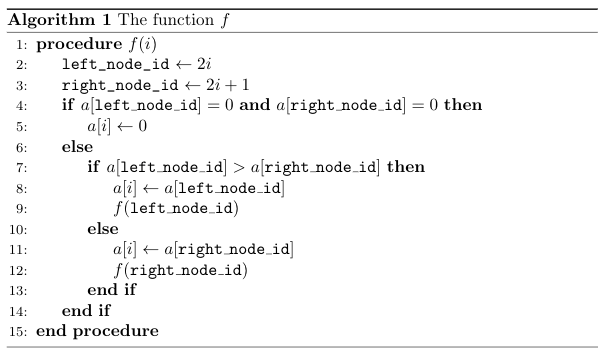Preparando MOJI
Drazil likes heap very much. So he created a problem with heap:
There is a max heap with a height $$$h$$$ implemented on the array. The details of this heap are the following:
This heap contains exactly $$$2^h - 1$$$ distinct positive non-zero integers. All integers are distinct. These numbers are stored in the array $$$a$$$ indexed from $$$1$$$ to $$$2^h-1$$$. For any $$$1 < i < 2^h$$$, $$$a[i] < a[\left \lfloor{\frac{i}{2}}\right \rfloor]$$$.
Now we want to reduce the height of this heap such that the height becomes $$$g$$$ with exactly $$$2^g-1$$$ numbers in heap. To reduce the height, we should perform the following action $$$2^h-2^g$$$ times:
Choose an index $$$i$$$, which contains an element and call the following function $$$f$$$ in index $$$i$$$:

Note that we suppose that if $$$a[i]=0$$$, then index $$$i$$$ don't contain an element.
After all operations, the remaining $$$2^g-1$$$ element must be located in indices from $$$1$$$ to $$$2^g-1$$$. Now Drazil wonders what's the minimum possible sum of the remaining $$$2^g-1$$$ elements. Please find this sum and find a sequence of the function calls to achieve this value.
The first line of the input contains an integer $$$t$$$ ($$$1 \leq t \leq 70\,000$$$): the number of test cases.
Each test case contain two lines. The first line contains two integers $$$h$$$ and $$$g$$$ ($$$1 \leq g < h \leq 20$$$). The second line contains $$$n = 2^h-1$$$ distinct positive integers $$$a[1], a[2], \ldots, a[n]$$$ ($$$1 \leq a[i] < 2^{20}$$$). For all $$$i$$$ from $$$2$$$ to $$$2^h - 1$$$, $$$a[i] < a[\left \lfloor{\frac{i}{2}}\right \rfloor]$$$.
The total sum of $$$n$$$ is less than $$$2^{20}$$$.
For each test case, print two lines.
The first line should contain one integer denoting the minimum sum after reducing the height of heap to $$$g$$$. The second line should contain $$$2^h - 2^g$$$ integers $$$v_1, v_2, \ldots, v_{2^h-2^g}$$$. In $$$i$$$-th operation $$$f(v_i)$$$ should be called.
2 3 2 7 6 3 5 4 2 1 3 2 7 6 5 4 3 2 1
10 3 2 3 1 8 2 1 3 1